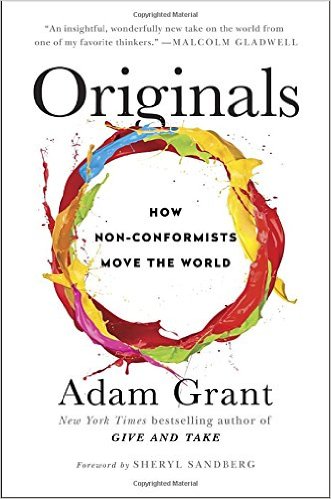Originals: How Non-Conformists Move the World by Adam Grant
A book that examines how people can champion new ideas. When the COO of Facebook says this book could very well inspire you to change your world you better take a read. Adam Grant has been recognized as Wharton's top-rated teacher for five straight years, and as one of the world's 25 most influential management thinkers and Fortune's 40 under 40. This book will turn you into an original.
Entrepreneurs who didn't quit there day job to start their business were 33% less likely to fail; because they were less confident they built companies that were meant to last. They weren't gamblers.
Creativity is a allowing yourself to make mistakes, art is knowing which ones to keep. - Scott Adams
The best way to be original is to create a lot of work, the odds are in your favor.
Our first ideas are often the most conventional, the closest to the default that already exist. It's only after we've ruled out the obvious that we have the greatest freedom to consider the more remote possibilities. Once you start getting desperate you start thinking out of the box.
Unbridled optimism comes across as salesmanship, it seems dishonest somehow and as a consequence is meant with skepticism. Everyone is allergic to the feeling, or suspicious of being sold. To come out saying your flaws or why a business venture will fail disarms the audience. They are no longer trying to poke holes but are now relaxed and don't think you're trying to hide something.
When asked to list 3 reasons life is good vs 12 reasons life is good people end up happier when listing only 3. It's easy to come up with 3, the speed at which they do becomes a factor of feedback, you finished the list quickly so you're happy. Listing 12 can be harder, based on the slower speed, feedback tells you you're sad. The same effect holds when asking someone to list 3 bad things in life vs 12. Finding it hard to list 12 makes you feel better than finding 3 quickly and easily. When pitching an idea or investment by listing out the easy to see problems you make it that much harder for people to think of their own problems, thus they conclude there aren't too many problems and it's a good idea.
Apply the familiarity effect. People are most accepting and prefer things they are familiar with. Reference the mirror test; if you take photos of someone and their friends that person will prefer their friends more in the non-mirrored photos but prefer themselves more in the mirrored. They see these versions of themselves and friends frequently and prefer the familiararity. If you were to pitch an idea and apply this concept- do a 30 second elevator pitch first (letting the idea sink in) then give the full on pitch, then even later follow up for feedback. The person you're pitching to will find the idea more appealing because they have become familiar with it.
False negatives, people want winners so they can be overly critical of how they expect an idea to do and filter their own ideas based on this - in effect they falsely classify ideas as negatives when they could have been real winners. You need to try many things to see the real winners. At the other side of this is the false positives - people are overly confident in their chosen ideas so much that they start to develop confirmation bias and will proceed with a dud.
The best judges of ideas are other active creators rather than managers or even the creator of the idea.
If you're going to make connections which are innovative, you have to not have the same bag of experiences as everyone else does. - Steve Jobs
There fear of not succeeding exceeds their fear of failing, they are shapers.
The greatest shapers don't stop at introducing originality into the world. They create cultures that unleash originality in others.
Hire not on cultural fit but on cultural contribution. When leaders prize cultural fit they end up hiring people who think in similar ways. Originality comes not from from people who match the culture but from those who enrich it.
Ask for problems, not solutions. If people rush to answers, you end up with more advocacy than inquiry, and miss out on the breadth of knowledge in the room.
The greatest originals are the ones who fail the most, because they're the ones who try the most...you need a lot of bad ideas in order to get a few good ones.
